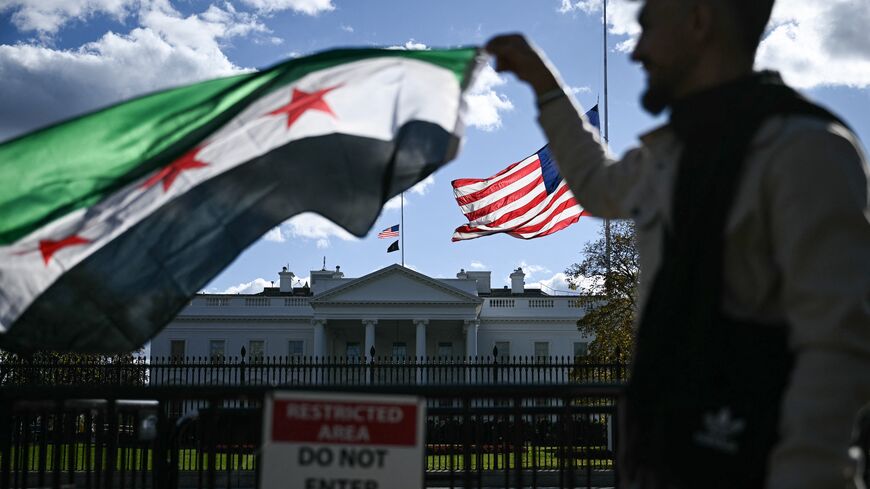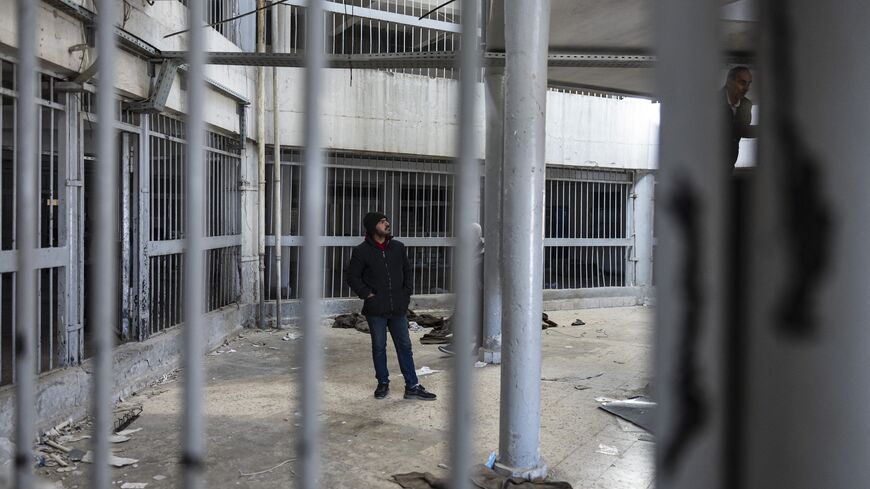Inside Congress' battle to repeal Syria's Caesar sanctions
Five months after President Trump pledged to lift sanctions on Syria, the harshest penalties remain on the books.

You're reading an excerpt from Al-Monitor Washington, where we break down the latest in US-Middle East diplomacy. To read the full newsletter, sign up here.
WASHINGTON — The White House is leaning hard on Congress to scrap its remaining sanctions on Syria or risk undermining the fragile new government the Trump administration sees as key to its broader ambitions for the region.
Nearly a year after Ahmed al-Sharaa led the lightning rebel insurgency that toppled the country’s repressive dictatorship, President Donald Trump has rescinded most American sanctions through executive order, fulfilling his pledge in May to give Syria and its newly formed government “a chance at greatness” after more than a decade of civil war left 90% of the population in poverty. But the most punishing of those sanctions that have isolated Syria from the global economy — those authorized under the Caesar Syria Civilian Protection Act — require congressional action to repeal.
‘Suffocating a nation’
Named for the Syrian defector whose photos exposed the Assad regime’s brutality, the 2019 law was an effort to tighten financial pressure on then-President Bashar al-Assad by authorizing sanctions on those who assist Syria’s military and certain industries. The Trump administration has issued a 180-day waiver suspending the Caesar Act, but experts say that only the permanent lifting of sanctions will provide international investors with the confidence to do business in Syria.
In a lengthy X post on Monday, the administration's Syria envoy, Tom Barrack, described the Caesar Act as a “sanctions regime that served its moral purpose” against Assad “but now suffocates a nation seeking to rebuild.” Repealing the sweeping law, he argued, would unleash “one of the most consequential reconstruction efforts since post-war Europe.”
Behind the scenes, officials across the White House and the State and Treasury Departments have been “very clear to Congress that the official position of the administration is full, clean repeal of Caesar,” a senior congressional aide said, speaking on condition of anonymity. Another congressional source said Barrack had placed calls to senior Republican lawmakers in recent weeks urging them to support the law's repeal.
Skepticism of Sharaa’s newly formed government was evident in July, when a House committee voted to advance legislation from Rep. Mike Lawler (R-N.Y.) that attached conditions to waive Caesar sanctions, including requiring Syria to show progress in combating drug trafficking and protecting minorities. All Democrats in the House Financial Services Committee voted against it, with the exception of Rep. Brad Sherman (D-Calif.). Rep. Byron Donalds (R-Fla.) was the lone Republican who opposed the bill.
Momentum builds
The push to fully repeal the sanctions has united an unexpected mix of lawmakers from both parties, with Sen. Jeanne Shaheen (D-N.H.), top Democrat on the Foreign Relations Committee, and Rep. Joe Wilson (R-S.C.) among those spearheading the effort to rescind Caesar. Some of the Syrian American advocacy groups that originally campaigned for the Caesar law’s passage are also now leading the charge for its removal.
“Everyone from Caesar himself to the families of those victims in the Caesar photos are calling for the Caesar Act to go,” said Mouaz Moustafa, executive director of the Syrian Emergency Task Force, a Washington-based nonprofit.
But some pro-Israel organizations in Washington are advocating to preserve the sanctions against a country they see as a potential threat to Israel and minority groups like the Alawites and Druze. Their push comes despite many in Syria's Jewish diaspora and their small community in Damascus having argued that sanctions relief is needed to restore their ancient heritage, as Al-Monitor reported earlier this year.
Sources familiar with the lobbying effort said senior Israeli officials, including Prime Minister Benjamin Netanyahu's close aide Ron Dermer, have also been involved in the outreach to lawmakers.
In its version of the annual defense policy bill known as the National Defense Authorization Act, the Senate inserted an amendment authored by Shaheen that would repeal the Caesar Act. But the Senate-passed NDAA also included an amendment from Sen. Lindsey Graham (R-S.C.) that requires the president to certify every six months that the Syrian government has met several conditions, including refraining from military action against Israel and taking steps to expel foreign fighters.
If the president fails to certify compliance for two consecutive reporting periods, “it is the sense of Congress” that Caesar sanctions should be reimposed. The language isn’t legally binding but has raised concern inside the Trump administration.
“It’s counterproductive since it will make companies and investors hesitate to do business with Syria,” a Trump administration official said. “Syria won’t get the full impact of sanctions relief.”
With the Senate's passage of the NDAA earlier this month, negotiations with the House can begin on a compromise version of the military-funding bill. On Thursday, House leadership began gauging support among members for the Caesar Act repeal, with a decision on its inclusion in the NDAA expected shortly, possibly as soon as next week. Once both chambers approve the final bill, Congress will send it to Trump for his signing by the end of the year.
The path forward
After nearly 14 years of bombing and shelling, Syria’s roads, hospitals and electrical grids are battered, particularly in the Damascus countryside and Aleppo — areas that saw some of the heaviest fighting between Assad’s forces and the rebels seeking to oust him.
The World Bank said Tuesday that rebuilding Syria will cost an estimated $216 billion, almost 10 times its gross domestic product last year. Unable to shoulder reconstruction costs, a high-level Syrian delegation — including the finance minister, economy minister and central bank governor — met with officials in Washington last week to advocate for the lifting of sanctions.
They also raised the steep 41% tariff that the Trump administration imposed on trade with Syria, one of the highest in the world. It comes as the Sharaa government contends with a fragile currency, high inflation and a crippled banking system.
If Congress doesn't include the Caesar repeal in this year’s NDAA, lawmakers may have to wait until next year’s must-pass defense bill to try again, as standalone legislation is far harder to bring to a vote.
Syrians say they can’t afford to wait another year for sanctions relief. As a business owner in Damascus recently told Amberin Zaman, sanctions are “like a rope around our throats.”





